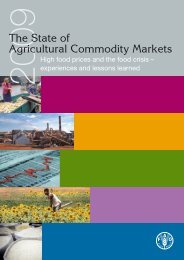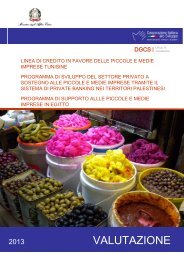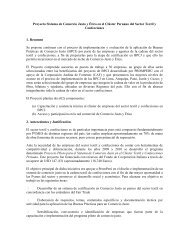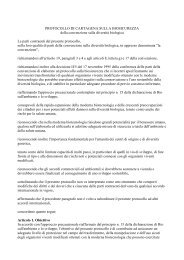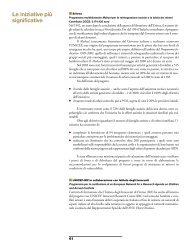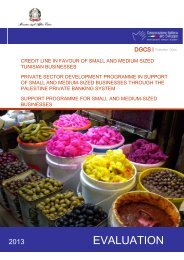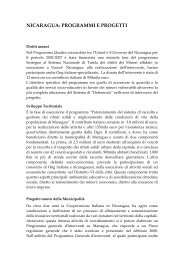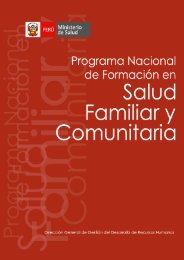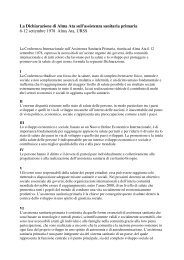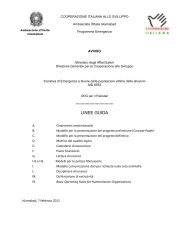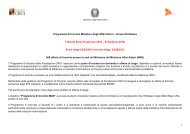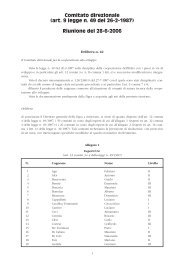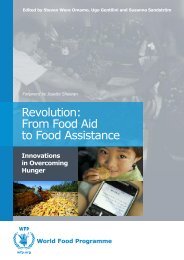FRONTESPIZIO - Cooperazione Italiana allo Sviluppo
FRONTESPIZIO - Cooperazione Italiana allo Sviluppo
FRONTESPIZIO - Cooperazione Italiana allo Sviluppo
You also want an ePaper? Increase the reach of your titles
YUMPU automatically turns print PDFs into web optimized ePapers that Google loves.
58 Carlo Resti, Yohannes TadesseHuman resources for health (HRH) – nurses, doctors, pharmacists, communityhealth workers, laboratory technicians, medical assistants, and manyothers – are at the core of health systems everywhere. Where there are HRHshortcomings, health systems will suffer, resulting in preventable death anddisease. Where HRH is in crisis, health systems will be in crisis.Such is the case in much of Sub-Saharan African countries (SSA). Hence,health workforce is said to be the glue of the health care delivery system.In every knowledge-based organization human resources act as a glue of the systemIn every knowledge-based organization human resources act as a glue of the system (adapted from JLI, 2004)(adapted from JLI, 2004)Human resources are also important from a budgetary perspective, typically accounting for 50 to 80percent of health sectors’ recurrent costs; formal and informal service remuneration are also animportant share of household expenditures on health. This entails that countries have the capacity toadvocate for, design, implement, monitor, and evaluate policies and practices to build sustainablehealth systems. At a time when the international community and SSA countries scale up interventionsto deal with the epidemics of tuberculosis, malaria, HIV-AIDS (GFATM and other various initiatives),the strengthening of the health workforce calls for immediate policy attention and action, as theworkforce situation all over the world and in Sub Saharan Africa is particularly critical:Human resources are also important from a budgetary perspective, typicallyaccounting for 50 to 80 percent of health sectors’ recurrent costs; formal andinformal service remuneration are also an important share of household expenditureson health. This entails that countries have the capacity to advocatefor, design, implement, monitor, and evaluate policies and practices tobuild sustainable health systems. At a time when the international communityand SSA countries scale up interventions to deal with the epidemics oftuberculosis, malaria, HIV-AIDS (GFATM and other various initiatives), thestrengthening of the health workforce calls for immediate policy attentionand action, as the workforce situation all over the world and in Sub SaharanAfrica is particularly critical:• Absolute numbers are inadequate, sometimes insufficient and decreasingbecause of the combined effects of brain-drain (out of the sector, out ofthe country) and HIV/AIDS; sometimes in excess for certain cadres, dueto poor training and employment regulation policies.• There are great imbalances: more doctors than nurses in certain countries,certain areas not covered (mental health, occupational health, publichealth, management), internal migrations with urban concentration, shiftAbsolute numbers are inadequate, sometimes insufficient and decreasing because of thecombined effects of brain-drain (out of the sector, out of the country) and HIV/AIDS;sometimes in excess for certain cadres, due to poor training and employment regulationpolicies.There are great imbalances: more doctors than nurses in certain countries, certain areasnot covered (mental health, occupational health, public health, management), internalmigrations with urban concentration, shift towards the private sectors’ greener pastures, gender



